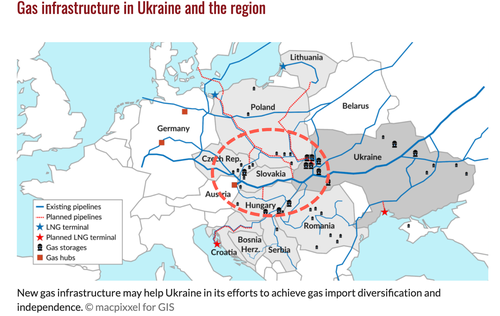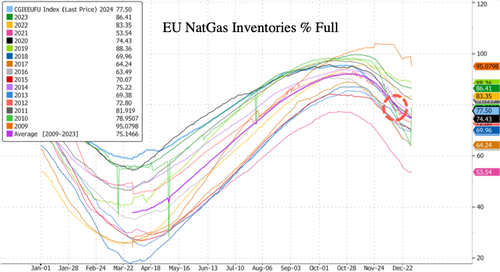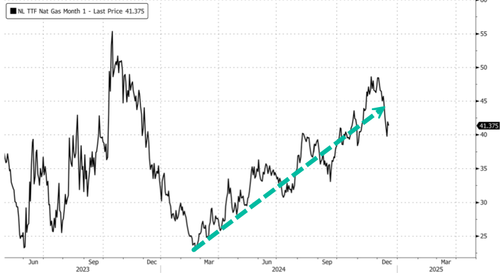Slovak Prime Minister Robert Fico has warned of financial turmoil and emphasized the urgent need to maintain Russian NatGas flows through Ukraine, as a NatGas transit agreement with Moscow is set to expire in the coming weeks.
Fico was quoted by Bloomberg on Wednseday, warning about the end of $525 million in transit fees per year it earns if Russian NatGas through Ukraine stops flowing. He said these fees are critical for state coffers.
"Are we just going to let that pipeline dry up?" Fico said, adding, "In the name of what? Because you don't like the Russians? Fine, I like them."
On Tuesday, Slovakia's state-owned energy company SPP, the country's largest energy supplier, and its partners in Hungary, Italy, and Austria urged the continuation of Russian NatGas flows through Ukraine.
"The declaration that we have prepared at SPP is intended to support the continuation of gas transportation through the territory of Ukraine and the preservation of its gas infrastructure, because it is the most advantageous solution not only for gas consumers in Europe, but also for Ukraine itself," said Vojtech Ferencz, Chairman of the Board and CEO of SPP.
CEO Ferencz warned:
"The document is an important voice of business directly responsible for the energy security and economy of the region, which may suffer significant economic damage in the near future. We will submit the declaration to the President of the European Commission Ursula von der Leyen so that she has first-hand information about the threat to energy and economic security in our region."
"Using the example of the Slovak Republic, we can calculate that if gas from the east flows to our territory only partially or stops flowing completely, any other alternative will be significantly more expensive," SPP said.
Ferencz added:
"If SPP, which has approximately a 65% share of our market, were to lose gas supplies from the east and we were to purchase the entire required volume from another source and physically transport it to Slovakia, it would cost us an additional 150 million euros. In the case of the entire Slovak market, it would be more than 220 million euros. The difference is mainly caused by transit fees, which will probably increase by next year, while their final amount is still unknown. At the same time, the interruption of natural gas supplies through Ukraine will naturally also result in an increase in its prices on wholesale markets. In addition, if a cold winter comes, this situation may cause a shortage of gas and problems with its supplies throughout Europe."
SPP presented the document to European Commission President Ursula von der Leyen so the Brussels bureaucrats would understand that their moves to shift entire European countries off cheap Russia NatGas would have severe economic consequences.
We previously noted in early October that Russian NatGas transits to the EU via Ukrainian pipelines are set to expire on Dec. 31.
Local paper The Kyiv Independent noted, "Kyiv said it has no intention of prolonging the deal as Moscow continues to wage its all-out war."
The SPP CEO warned that halting the Russian NatGas flows will only send EU NatGas prices higher as winter in the Northern Hemisphere intensifies in January.
Time is running out for Slovakia to avoid a pipeline halt. Bloomberg pointed out, "Several ideas have been floated to keep supplies coming, including with the help of intermediaries."
Meanwhile, Europe's gas inventories are falling in line with a 15-year average this winter (read here). The halt next month could accelerate the drawdown in supplies across the continent, with a Goldman analyst forecasting storage levels dropping to 39% by the end of the heating season—well below this year's 53% mark.
Goldman analyst Samantha Dart said the continent will still be able to refill inventories next summer, "but that requires a lot of things going right."
Locked in a 33-month war with Russia, Ukraine has repeatedly said it will not extend the NatGas transit agreement.
Slovak Prime Minister Robert Fico has warned of financial turmoil and emphasized the urgent need to maintain Russian NatGas flows through Ukraine, as a NatGas transit agreement with Moscow is set to expire in the coming weeks.
Fico was quoted by Bloomberg on Wednseday, warning about the end of $525 million in transit fees per year it earns if Russian NatGas through Ukraine stops flowing. He said these fees are critical for state coffers.
"Are we just going to let that pipeline dry up?" Fico said, adding, "In the name of what? Because you don't like the Russians? Fine, I like them."
On Tuesday, Slovakia's state-owned energy company SPP, the country's largest energy supplier, and its partners in Hungary, Italy, and Austria urged the continuation of Russian NatGas flows through Ukraine.
"The declaration that we have prepared at SPP is intended to support the continuation of gas transportation through the territory of Ukraine and the preservation of its gas infrastructure, because it is the most advantageous solution not only for gas consumers in Europe, but also for Ukraine itself," said Vojtech Ferencz, Chairman of the Board and CEO of SPP.
CEO Ferencz warned:
"The document is an important voice of business directly responsible for the energy security and economy of the region, which may suffer significant economic damage in the near future. We will submit the declaration to the President of the European Commission Ursula von der Leyen so that she has first-hand information about the threat to energy and economic security in our region."
"Using the example of the Slovak Republic, we can calculate that if gas from the east flows to our territory only partially or stops flowing completely, any other alternative will be significantly more expensive," SPP said.
Ferencz added:
"If SPP, which has approximately a 65% share of our market, were to lose gas supplies from the east and we were to purchase the entire required volume from another source and physically transport it to Slovakia, it would cost us an additional 150 million euros. In the case of the entire Slovak market, it would be more than 220 million euros. The difference is mainly caused by transit fees, which will probably increase by next year, while their final amount is still unknown. At the same time, the interruption of natural gas supplies through Ukraine will naturally also result in an increase in its prices on wholesale markets. In addition, if a cold winter comes, this situation may cause a shortage of gas and problems with its supplies throughout Europe."
SPP presented the document to European Commission President Ursula von der Leyen so the Brussels bureaucrats would understand that their moves to shift entire European countries off cheap Russia NatGas would have severe economic consequences.
We previously noted in early October that Russian NatGas transits to the EU via Ukrainian pipelines are set to expire on Dec. 31.
Local paper The Kyiv Independent noted, "Kyiv said it has no intention of prolonging the deal as Moscow continues to wage its all-out war."
The SPP CEO warned that halting the Russian NatGas flows will only send EU NatGas prices higher as winter in the Northern Hemisphere intensifies in January.
Time is running out for Slovakia to avoid a pipeline halt. Bloomberg pointed out, "Several ideas have been floated to keep supplies coming, including with the help of intermediaries."
Meanwhile, Europe's gas inventories are falling in line with a 15-year average this winter (read here). The halt next month could accelerate the drawdown in supplies across the continent, with a Goldman analyst forecasting storage levels dropping to 39% by the end of the heating season—well below this year's 53% mark.
Goldman analyst Samantha Dart said the continent will still be able to refill inventories next summer, "but that requires a lot of things going right."
Locked in a 33-month war with Russia, Ukraine has repeatedly said it will not extend the NatGas transit agreement.



